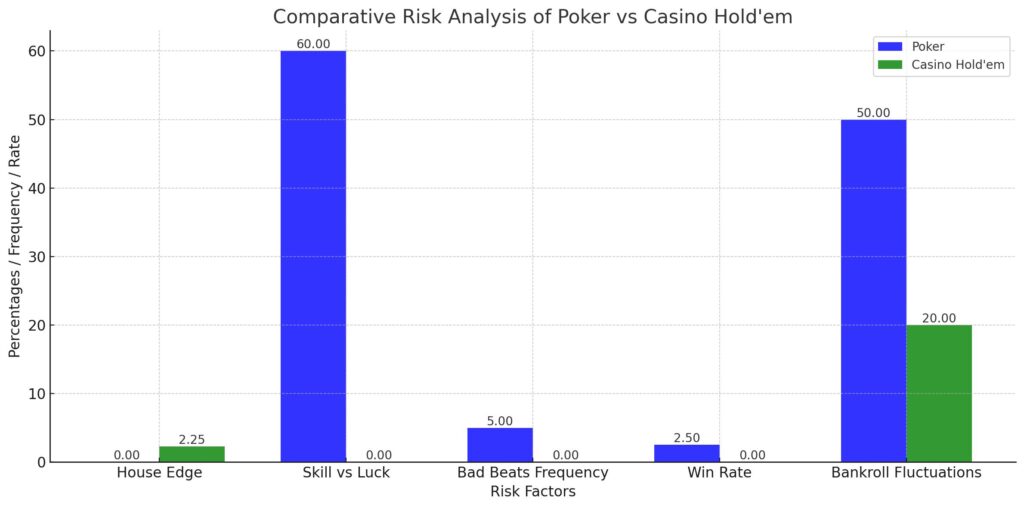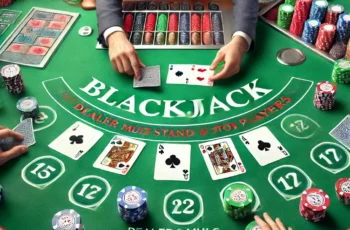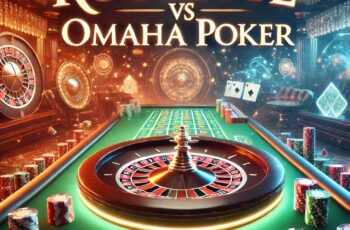Let’s cut the crap and get straight to it: if you think playing Poker or Casino Hold’em is a walk in the park, you’re in for a rude awakening. Both games are riddled with pitfalls and traps that could drain your wallet faster than you can say “all-in.” We’re diving into the murky waters of Poker vs Casino Hold’em to see which one is the bigger sucker’s bet. Spoiler alert: neither option is pretty.
The House Edge: The Silent Wallet Killer
The Deceptive Nature of Casino Hold’em

Casino Hold’em might look like a friendly game at first glance, but don’t let that fool you. The house edge is a sneaky bastard that ensures the casino always has the upper hand. Unlike traditional Poker where you’re battling other players, in Casino Hold’em, you’re up against the house—a house that’s designed to win.
- House Edge Explanation: The house edge in Casino Hold’em ranges from 2% to 2.5%. This means that for every $100 you wager, you’re expected to lose between $2 and $2.50 in the long run.
- Implication: Over extended play, this slight edge guarantees the casino profits while you slowly bleed money.
Poker: A Ruthless Battlefield
While Casino Hold’em has a built-in advantage for the house, Poker is no saint either. Sure, you’re not up against the house, but you’re squaring off with other players who are just as eager to clean you out. Bluffing, reading tells, and outsmarting your opponents is a high-stakes mind game that can leave you mentally drained and financially ruined.

- Competitive Edge: Unlike Casino Hold’em, Poker pits you against other players. Your success depends on your skill level relative to your opponents, making it a zero-sum game where your loss is another player’s gain.
- Financial Impact: A single mistake or misread can cost you a significant portion of your bankroll.
Skill vs Luck: The Harsh Reality
The Illusion of Skill in Poker
Poker players love to brag about their skills, but let’s be real—luck plays a massive role. You could be the best damn player in the room, but if Lady Luck isn’t on your side, you’re toast. One bad beat can wipe out your stack in an instant, leaving you to wonder why you even bothered to learn the game.

- Skill vs Luck Ratio: Even the most skilled players experience variance. Approximately 60% skill and 40% luck influence the game’s outcome.
- Bad Beats: These are unexpected losses where a strong hand gets beaten by an even stronger hand due to luck, impacting your overall strategy and bankroll.
Casino Hold’em: A Luck-Driven Disaster
Casino Hold’em, on the other hand, is a luck-driven disaster. Sure, there’s a bit of strategy involved, but for the most part, you’re at the mercy of the cards. The house’s built-in edge means that over time, you’re statistically guaranteed to lose. It’s not a question of if, but when.

- Luck Factor: Casino Hold’em is predominantly luck-based with minimal player decision impact. This reduces your control over the game’s outcome.
- Statistical Losses: The more you play, the more the house edge eats into your bankroll, ensuring long-term losses.
Techniques Gamblers Should Avoid
Chasing Losses: A Dangerous Spiral
One of the biggest mistakes gamblers make is chasing losses. This is when you continue to gamble in an attempt to recoup your losses, leading to even bigger losses.

- Poker: Chasing losses in Poker can result in reckless bets and poor decision-making. Players often go on tilt, letting emotions drive their play rather than strategy.
- Casino Hold’em: In Casino Hold’em, chasing losses against the house edge accelerates your financial decline.
Overestimating Skill: A Common Pitfall
Many gamblers overestimate their skill level, leading to overconfidence and poor decision-making.
- Poker: Overestimating your skills can make you take unnecessary risks, bluff too often, or play hands you should fold.
- Casino Hold’em: Thinking you can outplay the house edge is a delusion. The game’s structure ensures the house always has a statistical advantage.
Ignoring Bankroll Management: Recipe for Disaster
Proper bankroll management is crucial in both Poker and Casino Hold’em, yet many players neglect this aspect.
- Poker: Effective bankroll management involves setting aside a specific amount of money for playing and not exceeding it. Ignoring this can lead to significant financial loss.
- Casino Hold’em: Given the house edge, it’s essential to limit your losses and avoid betting more than you can afford to lose.
Falling for Gambler’s Fallacy: A Misguided Belief
The Gambler’s Fallacy is the belief that past events influence future outcomes. This misconception can lead to poor betting strategies.
- Poker: Believing that you’re “due” for a win after a series of losses can lead to reckless betting.
- Casino Hold’em: Assuming the cards will eventually turn in your favor disregards the statistical advantage the house holds.
Cold, Hard Facts: The Brutal Numbers
Poker: The Numbers Don’t Lie
Poker might seem like a game where skill dominates, but the data tells a different story. Let’s look at some cold, hard facts:

- Win Rate: The average win rate for skilled Poker players hovers around 2-3 big blinds per 100 hands. This means that even the best players only make a small profit over the long run.
- Bad Beats Frequency: On average, a Poker player will experience a bad beat every 20 hands. This high frequency can lead to significant variance and financial swings.
- Bankroll Fluctuations: Professional Poker players often report bankroll fluctuations of up to 50% in a single session, highlighting the game’s volatility.
Casino Hold’em: The Mathematical Trap
Casino Hold’em structure makes it a losing game in the long run. Here are some numbers that lay bare the harsh reality:
- House Edge: With a house edge of 2-2.5%, you’re guaranteed to lose money over time. For every $100 wagered, you’re statistically losing $2-$2.50.
- Average Losses: Regular Casino Hold’em players can expect to lose around 20% of their bankroll per hour of play due to the house edge and game speed.
- Return to Player (RTP): The RTP for Casino Hold’em is typically around 97-98%, meaning the casino always takes a cut of every bet you place.
Avoid These Strategies and Places: Insights from Veteran Gamblers
Strategies to Avoid Like the Plague
Veteran gamblers have been through the wringer and know which strategies are more likely to lead to ruin than riches. Here are some of their top warnings:

- Martingale Betting System: This strategy involves doubling your bet after every loss, aiming to recoup losses with a single win. It sounds good in theory, but in practice, it can quickly lead to massive losses, especially in games with high variance like Poker and Casino Hold’em.
- Playing on Tilt: Allowing emotions to dictate your play is a recipe for disaster. When you’re on tilt, you’re more likely to make irrational decisions, bet recklessly, and lose big.
- Ignoring Position in Poker: Position is crucial in Poker. Playing hands out of position can lead to costly mistakes and lost pots.
- Blindly Following Betting Patterns in Casino Hold’em: Assuming that certain patterns or streaks will continue can lead to misplaced bets and significant losses.
Casinos and Cities to Avoid
Some casinos and cities have a reputation for being especially harsh on gamblers. Here’s where seasoned players advise caution:
- Las Vegas Strip Casinos: While Las Vegas is the gambling mecca, the Strip casinos are notorious for their higher house edges and aggressive marketing tactics that can lure you into spending more than you planned.
- Atlantic City: Known for its high-stakes games and cutthroat environment, Atlantic City can be a brutal place for both novice and experienced gamblers.
- Macau: The gambling capital of Asia is famous for its ultra-high stakes tables and ruthless competition, making it a dangerous playground for those looking to win big.
- Local Indian Casinos: Some smaller casinos might have looser regulations and higher house edges, making them a risky choice for gamblers looking for fair play.
Famous Gamblers’ Advice
Even the pros have their horror stories and words of caution. Here’s what some of the big names have to say:

- Doyle Brunson: The legendary Poker player once said, “Poker is war. People pretend it’s a game.” His advice? Never underestimate your opponents and always be prepared for the worst.
- Phil Ivey: Known as one of the best Poker players in the world, Ivey warns against overconfidence. “No matter how good you are, you can always lose. Keep your ego in check.”
- Stu Ungar: The Poker prodigy who won the World Series of Poker three times had a tragic downfall due to his gambling habits. His life story serves as a stark reminder of the risks involved.
Conclusion
So, which is riskier: Poker or Casino Hold’em? The answer is both. Each game has its own unique set of risks and pitfalls that can lead to financial ruin. Whether you’re facing the deceptive house edge of Casino Hold’em or the ruthless competition of Poker, the odds are stacked against you. Play at your own risk, and remember—these games are designed to take your money. Stay cautious, stay skeptical, and maybe, just maybe, you’ll walk away with your sanity and wallet intact.

For the latest and most reliable information on casino games and other gambling-related content, visit our website regularly. If you have any questions or feedback, feel free to write to us – we’re always happy to help. And don’t hesitate to share your thoughts in the comments below. We’d love to hear from you!

OnlineGameReview.ca, your premier destination for honest and comprehensive game reviews in Canada. Our mission is to provide unbiased and thorough evaluations of all types of games, including casino, slot, PS5, and PC games. We pride ourselves on highlighting both the positive and negative aspects of each game, ensuring our readers make informed decisions. At OnlineGameReview.ca, we do not accept payments for reviews, maintaining our commitment to transparency and trustworthiness. Join us as we explore the gaming world and keep you updated on the latest trends and game quality.



No Responses